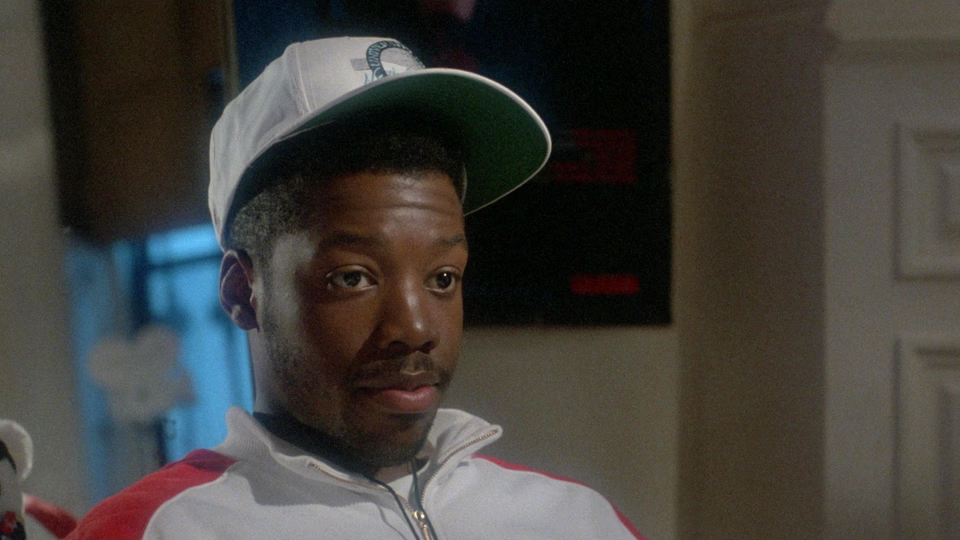Def by Temptation

After a decade devoid of black horror, twenty-one-year-old writer-director-star James Bond III’s Def by Temptation resuscitated the genre. While the execution shines—particularly in its horror sequences—Bond III struggles to fully develop his ambitious themes around sexuality, faith, and temptation.
The plot concerns a succubus, played by Cynthia Bond, preying on black men in New York City.
Bond III plays Joel, a young man raised by his grandmother after his minister father and mother were killed in a car accident. Joel is poised to follow his father’s footsteps into the ministry, but a crisis of faith sends him to New York City where he reunites with his childhood friend K, played by Kadeem Hardison.
The succubus soon sets her sights on Joel, leaving K and bar-rat Dougy, played by Bill Nunn, to battle her unholy powers for Joel’s soul.
Despite receiving sole director credit, Bond III delegated much of the technical direction to experienced cinematographer Ernest Dickerson, who handles the horror sequences with aplomb, showcasing a variety of acknowledged contemporary influences.
Drawing from Vamp’s creature design and green-and-red gel lighting schemes, Dickerson crafts an atmospheric visual palette.1 In a standout sequence, Dickerson one-ups an iconic scene from Videodrome, having a television devour a character, then, in a bit lifted from A Nightmare on Elm Street, the television burps out a mess of blood and entrails and we see the victim’s head press against the screen from the inside, stretching the now-pliable glass trying to escape.2 Great stuff.3
However, the dialogue often falters, confusing voice-over narration for dialogue. Consider an early exchange between Joel and his grandmother where she says, “And now, after this summer, you will complete your evangelistic training and go on to become the world-renowned minister we both foresee you doing.”
The scenes between Hardison and Bond III, however, shine with a more naturalistic rhythm, suggesting successful improvisation.4 Indeed, Hardison’s breakout charisma throughout leaves you wondering why he didn’t enjoy a bigger career in movies.
Bond III’s script also seems out of its depth with the film’s themes. The focus on black sexuality invites comparisons to Bill Gunn’s Ganja and Hess, but Bond III’s offering feels shallow compared to Gunn’s open-ended exploration of existential angst and guilt.
The film’s most powerful moment comes in its examination of sexual responsibility in the AIDS era. Consider the sequence where the succubus notices a man remove his wedding ring before entering the bar. She lures him back to her place. The next morning, he notices the large bruises and scars she’s left on him.
“Bitch, what the hell’s wrong with you?” he says. “I mean, how am I supposed to explain this to my…”
“Wife?” the succubus asks. “Norman,” she continues, “Yeah, I know who you are. Those marks are nothing compared to what you’re gonna get later. Honey, I’ve given you somethin’ there’s no cure for. It’s gonna grow and grow until it consumes you.”
She laughs as he realizes she’s infected him with HIV.
He tries to explain, “I never did this before, I mean, this is my first time. I mean, I just thought I could just walk away. I mean, just walk away. I mean, men are supposed to… like that.”
It’s a scathing indictment of black male sexual entitlement in a post-AIDS world. This potent critique makes the Joel subplot all the more frustrating, as it sidesteps these complexities for a reductive abstinence-until-marriage message that rings hollow, especially given the film’s surprising inclusion of gay and bisexual characters who, in 1990, lacked marriage options.
Granted, exploring the space between these positions and the cultural factors behind them might have been beyond the young creator, but it remains a missed opportunity.
Still, warts-and-all, the film entertains and fans of late ’80s horror should check it out. Just don’t expect Ganja and Hess. Indeed, for those who found Gunn’s work too obtuse, Def by Temptation may offer a more straightforward alternative at the expense of depth.
Notes
-
Dickerson specifically names The Hunger, Evil Dead 2, and Hellraiser as influences, but the Vamp connection is too obvious and likely just an unintentional omission. ↩︎
-
Ernest Dickerson, “Ernest & Lloyd” interview on Def by Temptation, directed by James Bond III (1990; Vinegar Syndrome, 2018), Blu-ray. ↩︎
-
And Dickerson had no part in the rather unfortunate monster finale. Dickerson shot the ending with the lit cross effect (which he engineered), then after production wrapped, Bond III went to work editing the film, and realized he needed some pickups and reshoots. He partnered with studio Troma for financing and Troma head Lloyd Kaufman shot the pickups that utilized the monster suit from Troma’s Sgt. Kabukiman N.Y.P.D.. ↩︎
-
Bond III hints as much in a career-spanning interview included on the Vinegar Syndrome disc. ↩︎